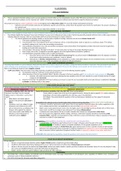Exam (elaborations)
EU
Rating
Sold
-
Pages
15
Uploaded on
18-06-2019
Written in
2018/2019
Nicely presented and easy to follow. Topics include: Article 267 Procedure, Direct Effect, State Liability, Indirect Effect, Social Policy and Free Movement (Goods, Persons, Services Establishment)
Institution
Module
Whoops, something went wrong.
Due to a technical error, we're unable to show you the document in the online viewer. Please try to download the file or get in touch with our support team.
Written for
- Institution
- University of Law
- Study
- Graduate Diploma in Law
- Module
- European Union Law
All documents for this subject (1)
Document information
- Uploaded on
- June 18, 2019
- Number of pages
- 15
- Written in
- 2018/2019
- Type
- Exam (elaborations)
- Contains
- Unknown
Subjects
-
freedoms
-
social policy
-
competition law
£9.26
Get access to the full document:
100% satisfaction guarantee
Immediately available after payment
Both online and in PDF
No strings attached
Get to know the seller
sago.palm_Antennarius.maculatus
Also available in package deal

Package deal
Law Bundle
5
2019
£ 62.19
More info

